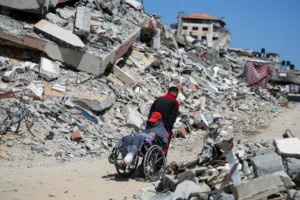Facing genocide while disabled

A Palestinian man pulls a disabled woman in a wheelchair past the rubble of a house destroyed by an Israeli bombardment in Khan Younis, southern Gaza, on 26 September 2024
Yousef M Aljamal reports in Al Jazeera on 19 November 2024:
The genocide in Gaza is a mass disabling event.
More than 400 days of Israeli air strikes and constant ground invasions on heavily populated areas have left more than 22,500 people who have sustained life-changing injuries. Hundreds of people with existing disabilities have been killed or remain under the rubble. Ninety percent of Gaza’s population has been displaced, some as many as 20 times.
The destruction of infrastructure hinders the mobility of people with all types of disabilities, making it extremely difficult for them to flee when ordered by the Israeli military.
Just as the Israeli army is destroying the healthcare system of the Strip, it has also decimated the system of care that used to exist for people with disabilities, killing many professionals who worked in the field. On May 13, Hashem Ghazal, the founder of the Atfaluna Society for Deaf Children and also known as the “spiritual father of deaf people in Gaza”, was killed in an Israeli air strike along with his wife.
I grew up in Gaza in the Nuseirat refugee camp. As a child, I knew many people who had been permanently disabled as a result of Israeli violence. Before the war, nearly 50,000 people in Gaza were registered as living with a disability.
While I am no longer in Gaza, this September I was able to speak on the phone and WhatsApp with several Palestinians with disabilities who have been displaced. Here are some of their stories:
Azmi Aljamal is nine years old. On October 15, 2023, he was pulled from under the rubble of his family home, which was targeted with two missiles that killed his mother, grandparents, uncle, two aunts, two siblings and three of his cousins. Azmi had fallen from the third floor and was badly injured. He is now in a wheelchair and needs surgery to repair his foot but can’t leave the country to get it.
Azmi’s family was displaced from Nuseirat to Rafah, and then back to Nuseirat, when the Israeli army invaded Rafah. His father Mousa told me “He needs special care, for instance, he needs a particular type of diaper, he is on a specific diet and needs vitamins which are not available.” His family struggled to get him ointment to cure his burns. Whenever there is a bombing nearby, his father carries Azmi and tries to provide him with some protection. Azmi’s dream is to walk again by himself.
Mahmoud Adnan Shokor is 31 years old and lives in the Nuseirat refugee camp. After falling from a construction site in 2018, he became paraplegic and developed speech difficulties. He uses a wheelchair and relies on his family’s help for everyday tasks. On November 4, Israel bombed his family home, injuring his mother and killing his cousin. His surviving family members and neighbours pulled Mahmoud out from under the rubble.
In the past, he received treatment in Egypt. Now Mahmoud’s medical condition is worsening. His mother told me: “He cries every day, and when it is time to escape and bombing is close, he cannot run for his life.” Mahmoud’s brothers Abed and Dyia carry him on their backs, despite the danger. Mahmoud told me he hasn’t been able to access medication to manage his condition.
Reem Ayad is 10 years old. Originally from the Zeitoun neighbourhood in Gaza City, she was playing with her brothers on October 16, 2023, when an Israeli warplane dropped two missiles on their home. Reem recounted: “We fled our home after it was partially destroyed over our heads. As we were fleeing in the street, they bombed the street right next to us and I was directly injured in my right hand, which led to its immediate amputation.”
